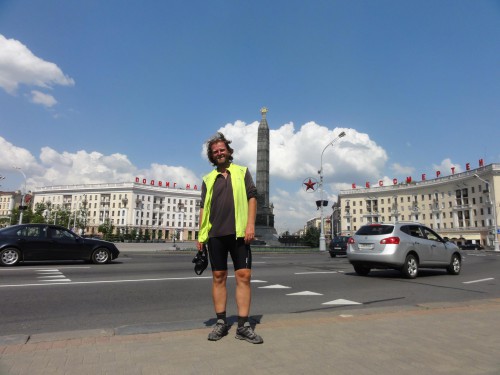31st May 2013
Lifestyle choices
New information and communications technologies (ICT) are changing the way we live and work. We can communicate instantaneously, find all sorts of information, and share ideas with others anywhere in the world.
This transformation isn’t uniform across the world. Not everyone has reliable access to fast broadband let alone the internet, or wants to spend a long time online, or even trusts new ICT. And much economic activity is still traditional – you can’t eat on-line, even if you can find out the price of bread in Cairo or Vanuatu.
But we now have increasing choice in our lives, which has spawned the phrase “lifestyle choices”, though I’m not sure that either выбор образа жизни or выбар ладу жыцця captures the breadth of meaning in English. We use the term to cover every aspect of our life: from how we work, what we do in our leisure time, to how we conduct our relationships with other people.
These choices were brought home to me by meeting an Englishman who has been cycling round Europe for the last two years. Followers of our Facebook pages will have seen that we welcomed him to Minsk last weekend.
While cycling round Europe, he is studying with the Open University. I’m not sure which is more remarkable.
Founded in 1969, the OU offered university level education to anyone in Britain, even if they didn’t have any educational qualifications, with the aim of allowing all “… to realise their ambitions and fulfil their potential”. Most study is by distance learning, but the OU has a campus where students can meet for intensive seminars.
Since its creation, and boosted by the creation of the internet, the OU has grown to nearly a quarter of a million students who study part-time, at home or, as in the case of the cyclist, travelling around Europe.
The OU provides courses with partners in other countries, such as business education in Russian. I was delighted that, as part of his visit to Belarus, the cyclist was able to meet Belarusians who organise the business courses, and cycle with an OU student.
Distance learning isn’t for everyone. I’ve started two courses and didn’t get far with either. I know you need to be well-motivated, interested in the subject and make the time to study alone. But it suits some, and the joy is having the flexibility to study when you want.
As for the cycling, I enjoyed my 90 km ride into Minsk with the cyclist. We talked a lot about his motivation and experiences around Europe. One of his main conclusions is that there is nothing to beat seeing places first hand: “websites aren’t always right” as he put it.
An OU student he met in Slovenia thought that it was very British to explore and undertake such journeys. I’m not sure Britons are particularly adventurous, but perhaps we have a certain independent spirit to do things in our own way.
There is something inspiring about people who undertake long journeys. The cyclist thought his main message was that you should try “to design your life for how you want to live”. On reflection, that’s a good definition of “lifestyle choices”.

Dear Bruce,
to me there ´s already in the headline of your easy-to – understand article the “K-Word”. “CHOICES”. And the answer is some lines amongst well written. Lifestyle choices…..for it ´s really sad but fact, that all these choices (I.e.: finding infos, sharing ideas ) are only granted for a part of the world ´s population. And this I do bed n o t everyone is able “… to realise his/her ambitions and fulfil the potential…”. In other words: A smaller part of us is very privileged – the bigger one not. There ´s only 1 little problem : The smaller one is taken all those things for granted without even attempting to think about the situation of the other part. I do like very much your lines about the ICT. (Information , communication technologies. But ´cause of too much PC-Crashes also known as International Catastrophical Transport). Esp. , that even today there are some , who doesn ´t want to spend their life online or that `s unimpossible to order a n d eat “Couscous” online from Cairo or Coconut – Milk from Port Vila/Vanuatu both and at the same time. To conclude : Thanks the lord – you ´ve always needed real human beings, you need them today and you will need them next day too. And few of us will even read /nead sometimes a crazy little thing called love or /and book. Best wishes, Hawyl faur + bora te, ond a guatar schtart een d ´r Mondich, Ingo-Steven Wais, Stutengarten, Caerdydd